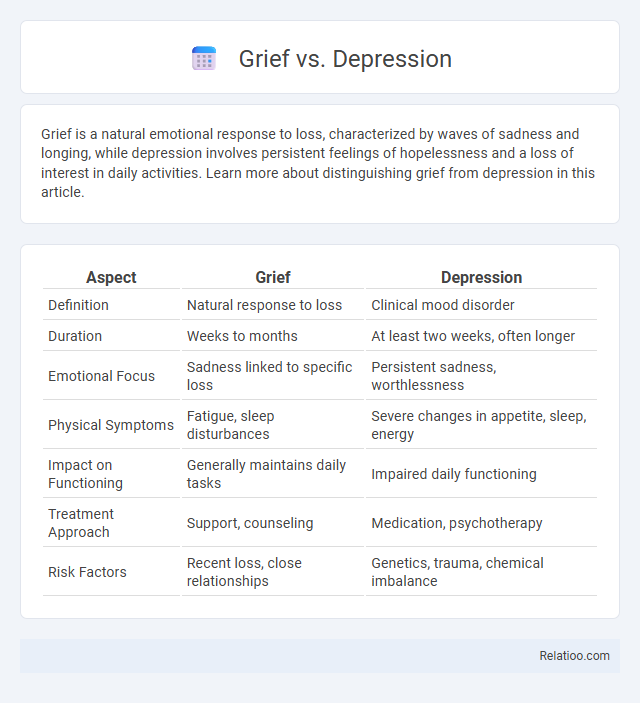Grief is a natural emotional response to loss, characterized by waves of sadness and longing, while depression involves persistent feelings of hopelessness and a loss of interest in daily activities. Learn more about distinguishing grief from depression in this article.
Table of Comparison
| Aspect | Grief | Depression |
|---|---|---|
| Definition | Natural response to loss | Clinical mood disorder |
| Duration | Weeks to months | At least two weeks, often longer |
| Emotional Focus | Sadness linked to specific loss | Persistent sadness, worthlessness |
| Physical Symptoms | Fatigue, sleep disturbances | Severe changes in appetite, sleep, energy |
| Impact on Functioning | Generally maintains daily tasks | Impaired daily functioning |
| Treatment Approach | Support, counseling | Medication, psychotherapy |
| Risk Factors | Recent loss, close relationships | Genetics, trauma, chemical imbalance |
Understanding Grief and Depression
Grief is a natural response to loss, characterized by feelings of sadness, yearning, and emotional pain that gradually lessen over time, while depression is a clinical condition marked by persistent low mood, loss of interest, and impaired daily functioning. Understanding grief involves recognizing its stages--denial, anger, bargaining, depression, and acceptance--whereas depression requires professional diagnosis and treatment due to its severity and duration. Your ability to differentiate between grief and depression is crucial for seeking appropriate support and ensuring mental health wellness.
Key Differences Between Grief and Depression
Grief primarily arises from a specific loss and involves a range of emotional, physical, and cognitive responses, often including sadness, yearning, and acceptance over time. Depression is a clinical mood disorder characterized by persistent feelings of hopelessness, lack of energy, and impaired daily functioning, which may not be linked to a specific event. Key differences include the presence of self-esteem preservation in grief, whereas depression often involves feelings of worthlessness and pervasive negative thoughts beyond the context of loss.
Common Symptoms of Grief
Common symptoms of grief include intense sadness, longing for the deceased, and emotional numbness, which differ from the pervasive hopelessness and lack of interest seen in depression. You may also experience physical symptoms such as fatigue, changes in appetite, and difficulty sleeping, which are natural responses to loss rather than clinical depression. Understanding these distinctions helps in recognizing grief as a healthy process while identifying when professional support may be needed.
Common Symptoms of Depression
Common symptoms of depression include persistent feelings of sadness, loss of interest in activities once enjoyed, fatigue, changes in appetite or weight, difficulty concentrating, and feelings of hopelessness or worthlessness. While grief often involves intense sorrow and emotional pain following a loss, depression can manifest similarly but typically persists much longer and affects daily functioning. Understanding these symptoms is essential for recognizing when you may need professional support beyond natural grieving.
How Grief Manifests Emotionally and Physically
Grief manifests emotionally through intense feelings of sadness, anger, confusion, and yearning, often accompanied by waves of emotional numbness or relief. Physically, grief can cause fatigue, changes in appetite, headaches, and a weakened immune response, often leading to sleep disturbances and bodily pain. Unlike clinical depression, grief typically fluctuates with moments of respite and is closely tied to specific loss events, whereas depression presents as persistent and pervasive low mood independent of external triggers.
Identifying Overlapping Signs
Grief and depression share overlapping signs such as persistent sadness, loss of interest in activities, and changes in sleep or appetite, but grief typically involves waves of intense sorrow tied to specific memories, whereas depression presents as a more constant, pervasive low mood. Both conditions can include fatigue, difficulty concentrating, and feelings of worthlessness, making clinical assessment crucial for accurate diagnosis. Recognizing these shared symptoms alongside unique features like guilt or thoughts of death in depression helps differentiate between normal bereavement and a depressive disorder.
Risk Factors for Complicated Grief and Depression
Risk factors for complicated grief include a close or dependent relationship with the deceased, sudden or traumatic loss, and lack of social support, which can intensify your emotional distress. Depression risk factors often involve a history of mental illness, chronic medical conditions, and exposure to prolonged stress or trauma, leading to persistent feelings of sadness and hopelessness. Understanding these distinct risk factors helps tailor appropriate interventions for grief and depression, promoting effective mental health care.
When Grief Turns into Depression
Grief is a natural emotional response to loss, while depression is a clinical mental health disorder characterized by persistent sadness and loss of interest in activities. When grief turns into depression, your feelings of sadness intensify, last longer than typical grief, and may include symptoms such as hopelessness, despair, and suicidal thoughts. Recognizing this transition early allows you to seek appropriate mental health support and prevent worsening of your condition.
Seeking Professional Help: When and Why
Seeking professional help during grief is crucial when intense emotions persist beyond several months or interfere significantly with daily functioning, indicating complicated grief. Depression requires prompt intervention as it involves persistent feelings of hopelessness, loss of interest, and may include suicidal thoughts, necessitating therapy or medication. Grief differs from depression in its episodic nature and typically diminishes over time, but professional support is essential if the individual struggles to cope or experiences severe emotional distress.
Coping Strategies and Support Resources
Coping strategies for grief emphasize acceptance, expressing emotions, and maintaining routines, while depression often requires structured interventions such as cognitive-behavioral therapy and medication. Support resources for grief include bereavement groups, counseling services, and spiritual guidance, whereas depression support typically involves mental health professionals, crisis hotlines, and psychiatric care. Understanding the differences helps tailor appropriate support, ensuring individuals access grief counseling or clinical treatment based on their specific needs.

Infographic: Grief vs Depression
 relatioo.com
relatioo.com